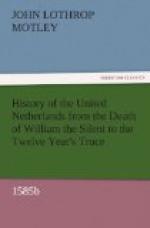It is agreeable to reflect, too, that the fame of the general is not polluted with the wholesale butchery, which has stained the reputation of other Spanish commanders so indelibly. There was no killing for the mere love of slaughter. With but few exceptions, there was no murder in cold blood; and the many lives that were laid down upon those watery dykes were sacrificed at least in bold, open combat; in a contest, the ruling spirits of which were patriotism, or at least honour.
It is instructive, too, to observe the diligence and accuracy with which the best lights of the age were brought to bear upon the great problem which Parma had undertaken to solve. All the science then at command was applied both by the Prince and by his burgher antagonists to the advancement of their ends. Hydrostatics, hydraulics, engineering, navigation, gunnery, pyrotechnics, mining, geometry, were summoned as broadly, vigorously, and intelligently to the destruction or preservation of a trembling city, as they have ever been, in more commercial days, to advance a financial or manufacturing purpose. Land converted into water, and water into land, castles built upon the breast of rapid streams, rivers turned from their beds and taught new courses; the distant ocean driven across ancient bulwarks, mines dug below the sea, and canals made to percolate obscene morasses—which the red hand of war, by the very act, converted into blooming gardens—a mighty stream bridged and mastered in the very teeth of winter, floating ice-bergs, ocean-tides, and an alert and desperate foe, ever ready with fleets and armies and batteries—such were the materials of which the great spectacle was composed; a spectacle which enchained the attention of Europe for seven months, and on the result of which, it was thought, depended the fate of all the Netherlands, and perhaps of all Christendom.
Antwerp, then the commercial centre of the Netherlands and of Europe, stands upon the Scheldt. The river, flowing straight, broad, and full along the verge of the city, subtends the arc into which the place arranges itself as it falls back from the shore. Two thousand ships of the largest capacity then known might easily find room in its ample harbours. The stream, nearly half a mile in width, and sixty feet in depth, with a tidal rise and fall of eleven feet, moves, for a few miles, in a broad and steady current between the provinces of Brabant and Flanders. Then, dividing itself into many ample estuaries, and gathering up the level isles of Zeeland into its bosom, it seems to sweep out with them into the northern ocean. Here, at the junction of the river and the sea, lay the perpetual hope of Antwerp, for in all these creeks and currents swarmed the fleets of the Zeelanders, that hardy and amphibious race, with which few soldiers or mariners could successfully contend, on land or water.




